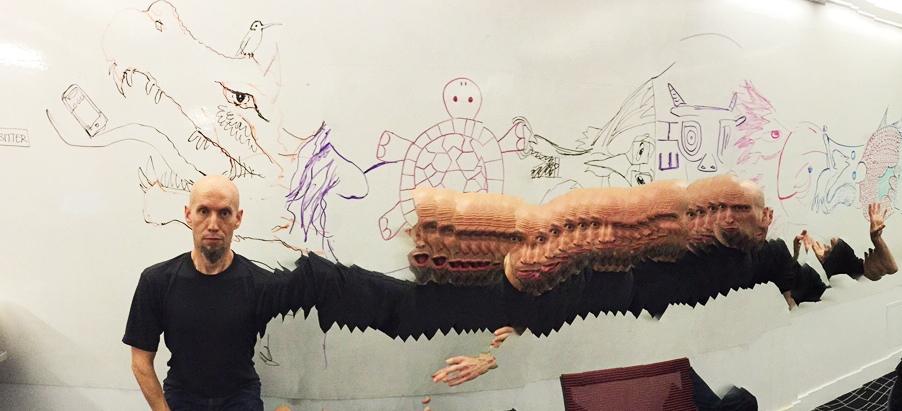… is an impossibly rewarding endeavour of everlasting proportions. Whether you are a systems librarian (Gordon, 2003), insecure with your academic identity (Knights & Clarke, 2013), or my therapist (DeAngelis, 1987), at some point as you transition into a community of practice, you may for a wondrous and fleeting moment in history “feel like you’re faking it” (Sherman, 2013).
In some ways we all imposter, and not just the scholarly, no matter how experienced we believe ourselves to be. In my particular case I am fully reconciled knowing that I will never “feel good enough”, always be, “unsure of what [I’m] doing”, and exquisitely wrapped in a ‘fuck-you-allish’ resolution that I will never ever “live up to others’ expectations” (p. 57). To abuse a war metaphor, battling with impostor syndrome is like dueling with the self in a sword fight you can’t possibly win without hurting. This is especially true if you know nothing of Hatsumi’s (2005) ‘Japanese sword fighting: Secrets of the samurai’, even though you may have some knowledge of physics and geometry.
So permit me to perform a feint retreat with my own novice expert.
In some vague and empirically invalidated ways, we are all good at some evasive ‘thing’, and by ‘good’ I mean we do something decently enough (besides eating) that we know could be done better. That drive, that impulse to want to improve, to be better, is the part of the impostor equation (to misuse a math metaphor) that many a perfectionist knows well. How to resolve the feeling of posturing the impostor then, is not what Sherman may have once well argued back in 2013, that “perfectionism is unrealistic and costly” (p. 58) and more specifically that “anything short of a flawless performance all the time is unacceptable” (p. 58). My impossible proposal is to assert the opposite (perhaps not linguistically opposed really); to reconcile that your perfectionism is a mechanism that keeps you forever in check with your own imposturing self. It is completely unfounded in research too, on purpose. Unlike Clance’s Impostor Phenomenon Scale (1985) or Kolligian and Sternberg’s (1991) beautifully named Perceived Fraudulence Scale I propose a different, self-monitoring instrument based in the bias of common sense founded by the oft-used never admitted to ontology of subjectivism. I call it the “Never Settle for Your Self as Expert Unless it’s your Bio” self-monitoring instrument or HOOEY for short. This, in contrast to the oft-experienced rarely admitted “I am the Foremost Expert on the Subject” or “#3 Influencer”, with one hell of a sexy headshot.
Those of us who have been stupid enough to suffer through our PhD’s know full well that the title of doctorate provides us with the HOOEY instrument in check. This is because in adding knowledge to the field (more like the edge of a hazy field upon which there are barely perceived battles with few lacerations) we are fulfilling a prerequisite of our doctoral studies. We are adding some new ‘thingy’ to the world (to quote an expert you wouldn’t know). Far from transforming us into experts we actually become imposters of the new, or in easier terms, novices. Are we well researched? Yes, sort of, depending on what you mean by ‘well’ and by ‘researched’. Have we published tons of research based on the new knowledge we are contributing to the world? No, unless of course it’s not new and you are hanging from the drawstrings of others (as the expression likely does not go).
So what?
All this to say, no matter if you are highly cited in google scholar or a relatively obscure, unpublished author like this one, embrace your imposter, admit to the syndrome that is all of us, and keep trying to improve while maintaining an eye to your HOOEY scale. But don’t let the self-monitoring of your own imperfection stop you. Do as I demonstrate here. Write through your own imposturing, and in that writing recognize that even though you are contributing ‘expertise’, and that you are old and wise, as Ayzner, Wanger, Tassone, Tolbert and Schwartz contend there is always “room to improve conjugated polymer-based solar cells” (2008). And if you have no idea what that means, then this small, insignificant, biased article has expertly failed in drawing an impactful conclusion.
Imposters no more
Ayzner, A. L., Wanger, D. D., Tassone, C. J., Tolbert, S. H., & Schwartz, B. J. (2008). Room to improve conjugated polymer-based solar cells: understanding how thermal annealing affects the fullerene component of a bulk heterojunction photovoltaic device. The Journal of Physical Chemistry C, 112(48), 18711-18716.
Chrisman, S. M., Pieper, W. A., Clance, P. R., Holland, C. L., & Glickauf-Hughes, C. (1995). Validation of the Clance imposter phenomenon scale. Journal of Personality Assessment, 65(3), 456-467.
DeAngelis, T. (1987). Therapists who feel as if they’re not therapists: The imposter syndrome. American Psychological Society Monitor, 18, 14.
Gordon, R. S. (2003). Overcoming the systems librarian imposter syndrome. Libres, 13(2).
Hatsumi, M. (2005). Japanese sword fighting: Secrets of the samurai. Kodansha International.
Knights, D., & Clarke, C. A. (2013). It’sa bittersweet symphony, this life: Fragile academic selves and insecure identities at work. Organization Studies, 0170840613508396.
Sherman, R. O. (2013). Imposter syndrome: When you feel like you’re faking it. Am Nurse Today, 8(5), 57-58.


Leave a Reply